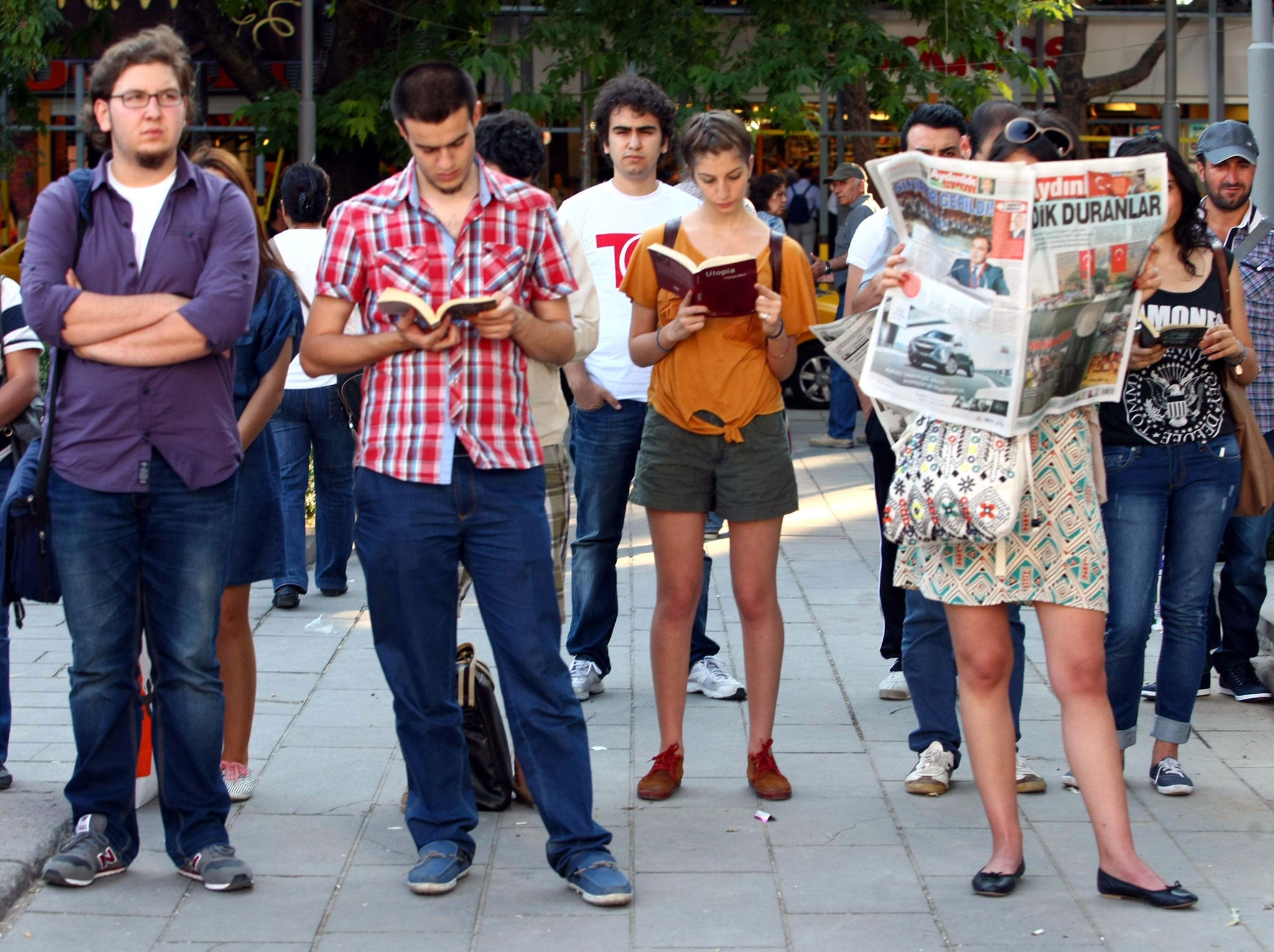Turkey's 'Standing Man' captured attention, but protest doesn't stand still - it forms assemblies
The loss of Gezi Park has inadvertently led to the development of community organisations. Could these be a sustainable foundation for mass social movement?

A third day of sustained and brutal police repression had left demonstrators in Istanbul exhausted. Following the eviction of Gezi Park, waves of mass arrests had cleared the streets of the protest movement that has been opposing the ruling AKP (Justice and Development Party) for the past fortnight. On the night of June 17th, the usually teeming Taksim Square lay eerily empty. That was until Erdem Gündüz entered the square, put his hands in his pockets, and stood still and silent, staring pointedly towards Turkish flags and a portrait of Kemal Ataturk.
Within hours this courageous and inspiring act had gone viral. Hundreds joined him in a silent vigil. The news spread through social media, becoming the top Twitter trend worldwide. The duran adam (‘standing man’) protest was subsequently replicated across the country and beyond – in Ankara, Izmir, Amsterdam and London. This was an exemplary show of passive resistance – singular, silent, stationary and symbolic. It at once tested the limits of the AKP’s democratic credentials by confronting head on Prime Minister Recep Tayyip Erdoğan’s divisive portrayal of the protesters as an enemy within or even foreign agents. When the protesters were eventually detained by the police for doing quite literally nothing, the standing man served to expose the dangerous absurdity of state violence currently taking place in Turkey.
The international press flocked to Gündüz, correctly praising his bravery while emphasising the great political significance of his act. Some claimed that the standing man had become the new icon of the movement. Others suggested that this ‘static social revolution’ could change the course of the Turkish politics. Such explanations are very much in the best traditions of ‘Great Man’ history writing, wherein individuals are presented as the motive force of historical transformation. Just as the histories of the civil rights movement, Tiananmen Square and the Suffragettes have been subsumed under the individuality of Martin Luther King, ‘the tank man’ and Emily Davidson, the Turkish movement suddenly became about the standing man.
Yet such an interpretation obscures the experience of collective struggle that shapes historical transformation. As @automnia tweeted, in a political movement, people do not stand still, there is action. Indeed, while Gündüz was taking his stand in Taksim, three miles away in Beşiktaş around 300 people had spontaneously come together in Abbasağa Park and held an open, participatory assembly – a ‘forum’ – to discuss next steps in the movement. Unlike Taksim, there was no press, there was no livestream; there was no worldwide Twitter trend and, thankfully, no police.
Having been eclipsed by the standing man, the forum went largely unreported. And yet the gathering in Abbasağa may eventually prove considerably more significant in the development of the Turkish resistance. For within a day, the people of Istanbul were out again. This time people weren’t clashing with police in central areas, but organising assemblies in their localities – autonomously and spontaneously. On Tuesday night there were eight across the city. On Wednesday this had grown to 27. On Thursday, there were 38 in Istanbul, 11 in Ankara and more in smaller towns such as Eskişehir and Mersin. Initially attracting between 100-1000 people each, by Wednesday around 3,000 people attended the forum in Yoğurtçu Park alone.
These forums are nothing short of remarkable - prefigurative spaces in which people are experimenting with, and cultivating, new, more extensive, more direct forms of democracy. Drawing on procedures common to the Indignados and Occupy movements, consensus decision making and horizontal organization forms are taking root. Leadership and hierarchy are – at the moment at least – shunned. Mutual aid workshops have been created for projects as diverse as reading groups for children, gardening, performance arts, and anti tear gas campaigns. There is an atmosphere of involvement, collective initiative and solidarity, in which new social relations are being formed. In short, by reclaiming public space for the purposes of non-hierarchical, democratic self-organisation, these forums constitute a living alternative to the stifling authoritarianism of the AKP.
The loss of Gezi Park was a blow for the movement, but it has inadvertently led to the development of community organisations that could prove much more difficult for the AKP to contain or repress. Both numerous and vast, these forums could become the basis for a mass social movement, that goes beyond the courageous but arguably unsustainable fortnight long uprising that preceded it. They are still in their infancy, riddled with potential problems. It remains to be seen whether they can avoid becoming isolated in their own localities, and at the same time remain dynamic and sustainable. What is certain is that this experience will radically alter the political life of Turkey. The standing man may be the new icon of the movement but the forums have given people previously alienated from Turkish politics a new found strength.

Join our commenting forum
Join thought-provoking conversations, follow other Independent readers and see their replies